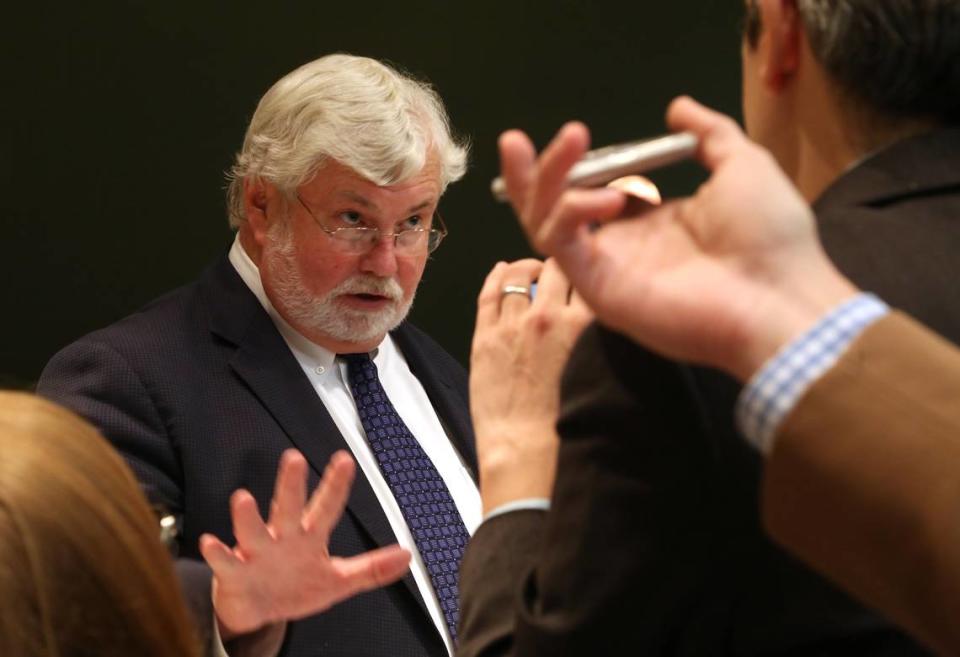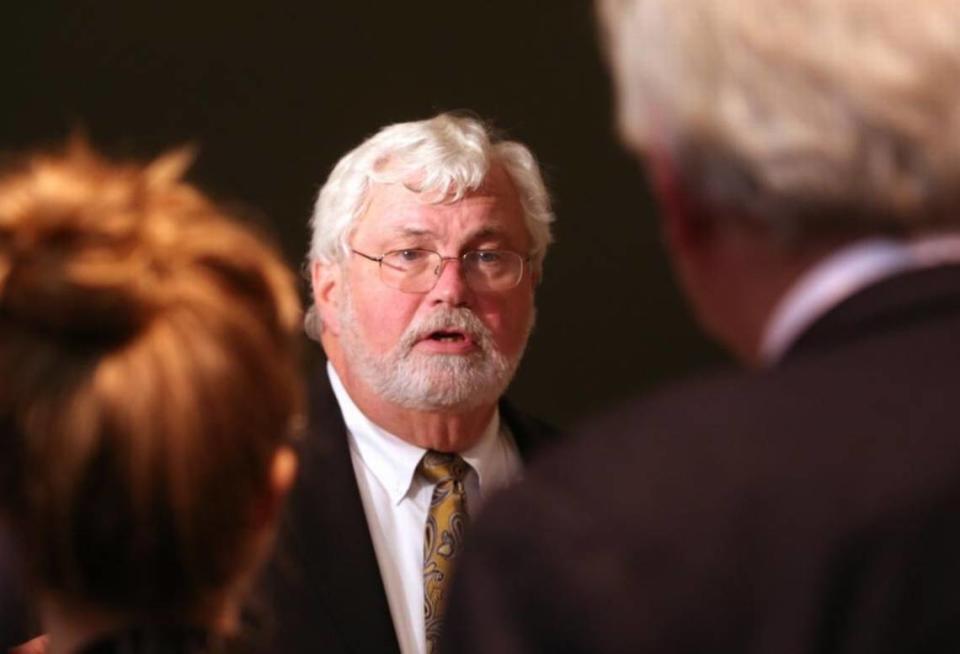Long-running ethics case against former Florida legislator Latvala nears dismissal
- Oops!Something went wrong.Please try again later.
A state lawyer has filed a motion asking the Florida Commission on Ethics to dismiss a complaint against former state Sen. Jack Latvala, more than five years after the Clearwater Republican resigned from office amid sexual-harassment allegations.
The request, filed Monday by Elizabeth Miller, an advocate for the commission, came after two women critical to the case refused to participate.
Latvala left office in 2017 after the release of a special master’s report about allegations he had sexually harassed Rachel Perrin Rogers, a former high-ranking Senate aide.
READ MORE: State Sen. Jack Latvala quits in face of corruption investigation, possible expulsion
Latvala was long a prominent figure in Tallahassee and served as the powerful Senate appropriations chairman before his resignation. He denied wrongdoing with the Senate aide but admitted he had an extramarital affair with former lobbyist Laura McLeod.
After receiving a complaint, the ethics commission launched a probe into the allegations in January 2018. The commission last year rejected a proposed settlement and referred the case to the Division of Administrative Hearings.
But Miller on June 30 asked an administrative law judge to drop the case against Latvala because Perrin Rogers and McLeod had refused to participate in the inquiry. Miller’s request was granted, and the Division of Administrative Hearings case was closed, sending the issue back to the ethics commission.
Miller’s motion Monday cited the same reasons for dropping the ethics commission case. Also, the person who filed the ethics complaint against Latvala in 2017 asked that his complaint be withdrawn.
“After Ms. Perrin Rogers failed to appear for two depositions, while under subpoena, it became apparent that she does not wish to participate in the proceedings,” Miller wrote. McLeod’s “reluctance to testify was made known” early in the commission’s investigation, she added.
“Two investigations [Senate’s and Commission’s] revealed sufficient evidence to find probable cause for various ethical violations. The sole reason for the case not to proceed with a formal hearing is lack of evidence in the form of critical witness’ testimony,” Miller wrote.
The commission could consider Miller’s motion at its next meeting on July 28.
Perrin Rogers, who served as chief legislative aide for then-Senate Majority Leader Wilton Simpson, filed a complaint in 2017 against Latvala with the Senate Rules Committee. She accused Latvala, in part, of groping her and making inappropriate sexual comments. An attorney for Perrin Rogers did not immediately respond to a request for comment Tuesday.
Miller noted that statements from Perrin Rogers and McLeod were taken during a Senate probe and by an ethics commission investigator. But the statements — not all of which were made under oath — alone “would not be admissible” at an administrative hearing, she said. And Latvala’s attorneys haven’t had an opportunity to question or cross-examine the women, the motion said.
“At this juncture, the only evidence available to the advocate are out-of-court statements to prove the truth of the issues at hand — or hearsay — for which no exception applies. Hearsay evidence alone is insufficient to support a finding” at the Division of Administrative Hearings, Miller wrote in the ethics commission motion.
“Although the investigations resulted in evidence to support a finding of probable cause by the Senate’s special master and the commission, the case is crippled without the direct, in court testimony of Ms. Perrin Rogers and Ms. McLeod. Wherefore, the advocate moves the Commission on Ethics for further disposition of the case,” she concluded.
Monday’s motion cited comments last fall from Perrin Rogers and McLeod.
“In the matter of the commission’s handling” of the complaint against Latvala, “my comments are as follows: Too little, too late,” Perrin Rogers wrote to the ethics commission on Nov. 9.
The following day, McLeod wrote a letter to her attorney advising him “that at this point I see no meaningful outcome or purpose to participate in in their [Commission on Ethics] process.”
Perrin Rogers did not show up June 29 for a scheduled deposition in Tallahassee, according to a transcript included in Monday’s motion. Tiffany Cruz, an attorney for Perrin Rogers, told Miller that her client was not appearing “at her own free will” and that no one had threatened, harassed or intimidated her into not appearing. Cruz also told Latvala’s attorney, Ryan Andrews, that she didn’t “have any reason to believe” Perrin Rogers would participate in a future deposition.
Monday’s motion also included a sworn statement from Thomas Rask, a Pinellas County Republican who filed the ethics complaint against Latvala on Dec. 27, 2017.
Saying “it would serve no public purpose to continue with it,” Rask asked to withdraw his complaint.
“The reason for the withdrawal request are chiefly that this complaint is in its 6th year, and the respondent [Latvala] is retired. No complaint should take that long to resolve because it isn’t fair to respondent to have a ‘cloud of suspicion’ hanging over them that long. Along the way, I did inquire more than once about the slow resolution of the case,” Rask’s statement said.
Also, Rask said, he had read that Latvala and his lawyers maintained that “social/sexual relationships between lobbyists and legislators cannot per se form the basis for a finding of an ethics violation consisting of misuse of public position” under Florida law.
“Complainant agrees with that opinion,” Rask added.
Rask said he filed the ethics complaint because he “did not want the Florida Senate to ‘get away’ with burying this matter” and to ensure that the ethics commission investigated the allegations about Latvala.
The Senate in 2021 reached a $900,000 settlement with Perrin Rogers, who said she faced discrimination and retaliation after filing the complaint against Latvala.
Miller’s motion Monday came nearly a year after the commission rejected a proposed settlement reached by Miller and the former senator.
Under the settlement, Latvala could have faced a public censure and reprimand, with the matter forwarded to the Senate for further action.
In what is known as a joint stipulation and recommended order, Latvala admitted to using “poor judgment” in a consensual two-decade relationship with a female lobbyist, which “may have constituted a technical violation” of state law. The proposed agreement said there was “no evidence that this affected his official actions in any way.” The settlement would have led to dismissal of other allegations, “as the evidence does not warrant moving forward.”
But the commission rejected the proposal on July 22, 2022, and voted to find “probable cause” on three allegations that Latvala had violated ethics laws, sending the case to an administrative law judge.
“There is a perception, to me, that there has been an egregious violation of the public trust, for which these ethics laws exist,” commission member Michelle Anchors said at the time. “And for that reason, I feel that this is a case that should be further litigated in front of DOAH [the Division of Administrative Hearings].”
Before the vote on the probable-cause findings, Latvala appeared before the commission and vehemently disputed allegations that he had sexually harassed the former Senate employee.
Latvala told the commission that the “biggest mistake I made was not standing and fighting right then.”
“My not fighting stops today,” he said. “I didn’t do what she [the former staff member] accused me of doing.”


